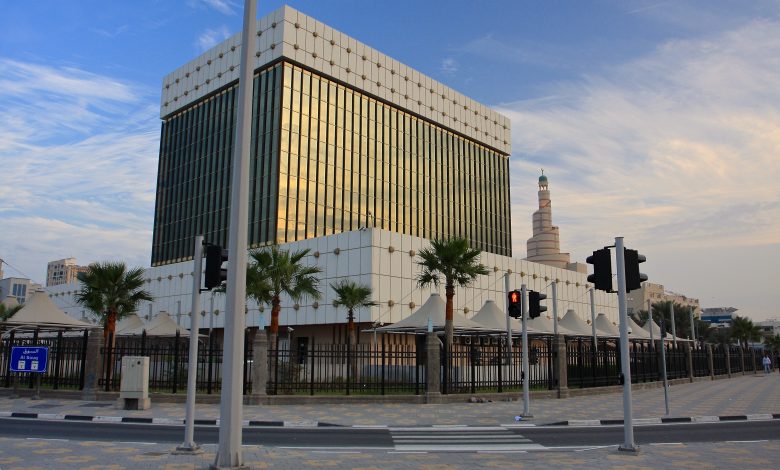
QCB Governor Hails Qatari Banks Ability to Maintain Strong Financial Position
محافظ مصرف قطر المركزي ينوه بقدرة البنوك القطرية على المحافظة على متانة وضعها المالي
QNA
Doha: HE Governor of Qatar Central Bank (QCB) Sheikh Abdullah bin Saud Al-Thani hailed the ability of Qatari banks to maintain the strength of their financial position despite the Covid-19 pandemic, stressing that measures to confront it did not affect the financing policies of the banking sector in the country.
HE said that the financing policies of banks are achieving their goals, indicating that the domestic credit growth exceeded QR 1 trillion at the end of 2020.
In an interview with Al-Sharq newspaper published Sunday, HE Sheikh Abdullah bin Saud Al-Thani said that QCB has adopted continuous proactive plans to face local and regional economic challenges, especially in light of the Covid-19 pandemic outbreak.
QCB Governor revealed the reasons that led to the drop in banks’ profits in 2020 to about 8.1%, foremost among which is banks’ hedges and additional allocations against expected credit losses, which have become a requirement for Qatari banks with the application of the International Accounting Standard and the corresponding standard for Islamic banks since 2018, as well as irregular debt and the allocations of impairment of assets due to unfavorable developments in 2020.
HE reviewed the measures taken to ensure the protection of the banking sector from the risks of money laundering in accordance with a national strategy to combat the financing of terrorism, emphasizing that the State of Qatar has one of the lowest crime rates in the world, and it is also one of the safest countries in the world. However, this did not prevent the State and Qatar Central Bank from taking a set of measures to ensure that the financial and banking sector is protected from money laundering and terrorist financing risks, through a number of legislations, he added.
He continued to say that QCB has an independent department for anti-money laundering and terrorist financing, which carries out the tasks of monitoring and supervising financial institutions through its various units, which includes field control unit, office supervision, a department for support, coordination and cooperation, and a section for technical analysis. Qatar Central Bank, he said, issued a set of executive instructions and regulations to combat Money Laundering, Terrorism Financing and the Financing of Weapons of Mass Destruction Proliferation in financial institutions from December 2019 to January 2021.
HE Sheikh Abdullah bin Saud Al-Thani affirmed that QCB is ready to support small and medium-sized enterprises (SMEs), in order to achieve and raise the level of self-sufficiency in all sectors and provide comfortable liquidity while directing interest rates to the required level.
His Excellency said that the resilience shown by the Qatari economy is a combination of factors, including the policy measures taken by Qatar Central Bank and the economic diversification strategy adopted over the years, which have contributed and will continue to contribute to transforming challenges into opportunities that enhance the growth of the Qatari economy.
He pointed out that QCB, through the banking sector, is ready to support the private sector, especially the SMEs, and push forwards the Qatari economy towards self-sufficiency, by enhancing credit growth as appropriate, adding that QCB proactively carries out liquidity management processes to ensure comfortable liquidity for the banking system, while directing rates interest to the desired level.
HE also revealed five measures set by Qatar Central Bank to ensure the transparency of the operations of exchange companies in the country through a complete online system, to follow up, control and analyze all financial transfers.
The Governor of Qatar Central Bank referred to the reasons for prohibiting the circulation of digital currencies, saying that central banks around the world have not reached a specific agreement in terms of the mechanism of dealing with digital currencies, especially those that are not denominated in any assets, noting that QCB has banned the circulation of digital currencies that are not denominated in any assets, due to their high price volatility and the associated identity risks.
He added that with regard to the digital currency of the central bank, many central banks in the world, including the Qatar Central Bank, have studied the possibility of launching the digital currency of the central bank, and the extent of the impact of this currency on the management of monetary policy and financial stability.
Regarding preparation for dealing with Basel standards and rules and how the share of Islamic banks will be, His Excellency said that developing Qatar Central Bank’s instructions to comply with the latest amendments introduced by the Basel Committee is an ongoing process, as Basel’s instructions are applied up-to-date and some of them are already implemented, such as those in the joint project between Qatar Central Bank and all national banks.
He added that Qatar Central Bank are in the process of issuing a capital adequacy standard for both conventional and Islamic banks during the current year, to be ready for application to banks starting in 2023.
Regarding the bond and sukuk issuance, HE QCB Governor Sheikh Abdullah bin Saud Al-Thani affirmed that the bank did not issue any sukuk in 2020, and that the decision depends on the needs of the Ministry of Finance, and treasury bills amounting to QR 7.2 billion have been reissued, and the balance of treasury bills is currently QR 3 billion.
قنا
الدوحة: نوه سعادة الشيخ عبدالله بن سعود آل ثاني محافظ مصرف قطر المركزي بقدرة البنوك القطرية على المحافظة على متانة وضعها المالي رغم الوباء العالمي.. مؤكدا أن إجراءات مواجهة جائحة كورونا /كوفيد-19/ لم تؤثر على السياسات التمويلية للقطاع المصرفي بالدولة، وأن السياسات التمويلية للبنوك تحقق أهدافها، مشيرا إلى تجاوز نمو الائتمان المحلي التريليون ريال في نهاية عام 2020.
وأوضح سعادة الشيخ عبدالله بن سعود آل ثاني في حوار مع صحيفة /الشرق/ القطرية نشرته اليوم، أن مصرف قطر المركزي اعتمد خططاً استباقية متواصلة لمواجهة التحديات الاقتصادية المحلية والإقليمية خاصة إزاء مواجهة جائحة كورونا /كوفيد -19/.
وكشف محافظ مصرف قطر المركزي الأسباب التي أدت إلى تراجع أرباح البنوك خلال 2020 إلى نحو 8.1 في المئة، وفي مقدمتها تحوط البنوك وتكوينها لمخصصات إضافية مقابل الخسائر الائتمانية المتوقعة والتي أصبحت متطلباً على البنوك القطرية مع تطبيق المعيار المحاسبي الدولي والمعيار المقابل له للبنوك الإسلامية منذ 2018 ومقابلة الديون غير المنتظمة ومخصصات هبوط قيمة الاستثمارات نتيجة لما شهده عام 2020 من تطورات غير مواتية.
واستعرض الإجراءات المتخذة لضمان حماية القطاع المصرفي من مخاطر غسل الأموال وفق استراتيجية وطنية لمكافحة تمويل الإرهاب، قائلا: “في البداية نود التأكيد على أن دولة قطر تعد واحدة من أقل دول العالم في معدلات الجريمة، كما أنها واحدة من أكثر الدول أمانا على مستوى العالم ، إلا أن ذلك لم يمنع الدولة ومصرف قطر المركزي من اتخاذ مجموعة من التدابير والإجراءات، لضمان حماية القطاع المالي والمصرفي من مخاطر غسل الأموال وتمويل الإرهاب وذلك من خلال عدد من التشريعات”.
وتابع: “كما أن لدى مصرف قطر المركزي إدارة مستقلة لمكافحة غسل الأموال وتمويل الإرهاب، حيث تقوم تلك الإدارة بمهام الرقابة والإشراف على المؤسسات المالية من خلال الأقسام المختلفة بالإدارة، التي تتضمن قسماً للرقابة الميدانية وقسماً للرقابة المكتبية وقسماً للدعم والتنسيق والتعاون وقسماً للتحليل الفني، كذلك أصدر مصرف قطر المركزي مجموعة من التعليمات التنفيذية والإرشادات التكميلية والأدلة التطبيقية لمكافحة غسل الأموال وتمويل الإرهاب وتمويل انتشار أسلحة الدمار الشامل بالمؤسسات المالية في الفترة من ديسمبر 2019م إلى يناير 2021م”.
وأكد سعادة الشيخ عبدالله بن سعود آل ثاني محافظ مصرف قطر المركزي أن المصرف جاهز لدعم الشركات الصغيرة والمتوسطة، لتحقيق الاكتفاء الذاتي والحرص على المساهمة في رفع مستوى الاكتفاء الذاتي في كافة القطاعات وتوفير سيولة مريحة مع توجيه أسعار الفائدة إلى المستوى المطلوب .
وقال سعادته “إن المرونة التي يظهرها الاقتصاد القطري هي مزيج من العوامل بما في ذلك تدابير السياسة التي يتخذها مصرف قطر المركزي واستراتيجية التنويع الاقتصادي المتبعة على مر السنين، التي ساهمت وستظل تساهم في تحويل التحديات إلى فرص تعزز نمو الاقتصاد القطري”.
وأضاف: “أن المصرف ومن خلال القطاع المصرفي جاهز لدعم القطاع الخاص وخاصة الشركات الصغيرة والمتوسطة الحجم ودفع الاقتصاد القطري نحو الاكتفاء الذاتي، وذلك من خلال دعم نمو الائتمان بالشكل المناسب، حيث يقوم المصرف بعمليات إدارة السيولة بشكل استباقي لضمان سيولة مريحة للنظام المصرفي مع توجيه أسعار الفائدة إلى المستوى المطلوب”.
وكشف عن خمسة إجراءات وضعها مصرف قطر المركزي لضمان شفافية عمليات شركات الصرافة بالدولة عبر نظام إلكتروني كامل، لمتابعة ورقابة وتحليل كافة الحوالات المالية .
وأشار محافظ مصرف قطر المركزي إلى أسباب حظر تداول العملات الرقمية، قائلا: “إن البنوك المركزية على مستوى العالم لم تصل إلى اتفاق معين من حيث آلية التعامل مع العملات الرقمية، وخصوصاً تلك غير المقومة بأي أصول، وقام مصرف قطر المركزي بتعميم حظر تداول العملات الرقمية غير المقومة بأي أصول، نظراً لتقلب أسعارها العالي ومخاطر الهوية المرتبطة بها”.
وأضاف: “بالنسبة للعملة الرقمية للبنك المركزي، قامت العديد من البنوك المركزية في العالم ومنها مصرف قطر المركزي بدراسة مدى إمكانية إطلاق العملة الرقمية الخاصة بالبنك المركزي، ومدى تأثير هذه العملة على إدارة السياسة النقدية والاستقرار المالي”.
وبشأن الاستعداد للتعامل مع معايير وقواعد بازل وكيف ستكون حصة المصارف الإسلامية منها، قال سعادته: “إن تطوير تعليمات مصرف قطر المركزي لتتوافق مع أحدث التعديلات التي تدخلها لجنة بازل هو عملية مستمرة.. حيث يتم تطبيق تعليمات بازل أولا بأول وبعضها يتم تطبيقه بشكل مبكر مثل تطبيق تلك التعليمات من خلال مشروع مشترك بين مصرف قطر المركزي وجميع البنوك الوطنية وبمشاركة مكتب متخصص لتنفيذ سيناريوهات التطبيق.. ونحن في مصرف قطر المركزي بصدد إصدار معيار كفاية رأس المال لكل من البنوك التقليدية والإسلامية خلال العام الجاري، ليكون معدا للتطبيق لدى البنوك اعتبارا من عام 2023”.
وبخصوص إصدار السندات والصكوك أكد سعادة الشيخ عبدالله بن سعود آل ثاني محافظ مصرف قطر المركزي أن المصرف لم يصدر أي صكوك في 2020، وأن القرار يعتمد على احتياجات وزارة المالية، وتمت إعادة إصدار أذونات خزينة مقدارها 7.2 مليار ريال ويبلع رصيد أذونات الخزينة حالياً 3 مليارات ريال .



